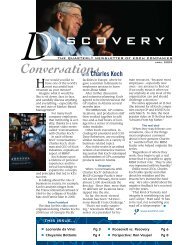Standing on principles
October 2009 - Koch Industries, Inc.
October 2009 - Koch Industries, Inc.
Create successful ePaper yourself
Turn your PDF publications into a flip-book with our unique Google optimized e-Paper software.
David H. Koch<br />
Perspective<br />
Exec. vice president – Koch Industries, Chairman and CEO – Koch Chemical Technology Group<br />
8<br />
Health care is an enormous subject,<br />
ranging from basic medical research and<br />
clinical trials to the actual delivery of care<br />
to patients.<br />
It is also a highly political subject, especially<br />
here in the United States, where<br />
countless health care proposals have been<br />
debated this year.<br />
For a variety of reas<strong>on</strong>s, I have a deep<br />
pers<strong>on</strong>al interest in our health care system.<br />
This interest is reflected not <strong>on</strong>ly in<br />
my charitable c<strong>on</strong>tributi<strong>on</strong>s<br />
but in how I invest<br />
my time.<br />
I serve <strong>on</strong> the boards<br />
of numerous hospitals,<br />
medical research centers,<br />
medical foundati<strong>on</strong>s and<br />
university-based medical<br />
research programs. I<br />
also serve <strong>on</strong> the advisory<br />
board for the Nati<strong>on</strong>al<br />
Cancer Institute.<br />
I have never seen so<br />
many organizati<strong>on</strong>s, employees and<br />
citizens upset and c<strong>on</strong>cerned about the<br />
future of their health care as I have in<br />
recent m<strong>on</strong>ths.<br />
They have good reas<strong>on</strong> to be upset, because<br />
<strong>on</strong>e of the world’s most innovative<br />
and effective health care systems is now<br />
under fierce attack.<br />
At risk<br />
For me, <strong>on</strong>e of the most critical aspects of<br />
health care is the innovati<strong>on</strong> that brings us<br />
better treatments, improved procedures<br />
and, ultimately, cures for life-threatening<br />
diseases.<br />
These advances benefit milli<strong>on</strong>s of people<br />
as they become more widely available at<br />
lower and lower costs, much as computers<br />
have become comm<strong>on</strong>place and affordable.<br />
From the Mayo Clinic to M.D. Anders<strong>on</strong>,<br />
the world’s finest medical research in so<br />
many crucial areas – particularly cancer –<br />
is c<strong>on</strong>ducted here in the U.S.<br />
I’m very c<strong>on</strong>cerned that a government<br />
takeover of health care will affect that<br />
research in a variety of harmful ways.<br />
I also worry that further socializati<strong>on</strong> of our<br />
health care system is going to dramatically<br />
decrease the reimbursements that the great<br />
centers receive for the care they give.<br />
“I have never seen so many<br />
organizati<strong>on</strong>s, employees and<br />
citizens upset and c<strong>on</strong>cerned about<br />
the future of their health care.”<br />
C<strong>on</strong>sequently, they will see reducti<strong>on</strong>s in<br />
revenue and experience massive losses.<br />
When that happens, they will close or<br />
disappear or, at the very least, become<br />
less effective.<br />
Reality check<br />
There are huge differences between a<br />
leading teaching research hospital located<br />
in a major city and a small regi<strong>on</strong>al<br />
medical center. Those differences include<br />
medical educati<strong>on</strong>, operating costs and<br />
the quality of care.<br />
Here in New York City, where I live with<br />
my wife and children, we have extraordinary<br />
medical facilities. Hospitals such as<br />
Memorial Sloan-Kettering and New York<br />
Presbyterian are am<strong>on</strong>g the very best in<br />
the world.<br />
Because they are in New York City, their<br />
costs are much, much greater than those<br />
of hospitals in my hometown of Wichita,<br />
Kansas, let al<strong>on</strong>e at a small county hospital<br />
such as the <strong>on</strong>e in my father’s hometown<br />
of Quanah, Texas.<br />
If our government insists <strong>on</strong> reimbursing<br />
all hospitals equally, some of the world’s<br />
most advanced instituti<strong>on</strong>s will not <strong>on</strong>ly<br />
be reduced to the lowest comm<strong>on</strong> denominator,<br />
they’ll utterly collapse.<br />
At New York Presbyterian, for example, if<br />
the government drops its reimbursement<br />
rates for all patients from current rates to<br />
Medicare plus 10 percent, that hospital<br />
will see a $400 milli<strong>on</strong> drop in revenues<br />
and go bankrupt. Our government will<br />
literally put them out of business.<br />
Keep in mind that – to make matters<br />
worse – the bill recently approved by the<br />
Senate finance committee would reduce<br />
Medicare reimbursements by $400 billi<strong>on</strong><br />
over the next 10 years.<br />
True, the government will have succeeded<br />
in its goal of “lowering costs,” but at what<br />
price to patients, employees and communities?<br />
Disincentives<br />
There’s even a possibility that the government<br />
will decide to treat all medical<br />
instituti<strong>on</strong>s as taxable entities. This would<br />
be disastrous in terms of capital gifts<br />
from d<strong>on</strong>ors who today help underwrite<br />
groundbreaking research and support<br />
charity hospitals.<br />
If gifts to a research hospital are no l<strong>on</strong>ger<br />
tax deductible, what does that mean<br />
for capital campaigns that provide the<br />
primary funding for new facilities, new<br />
research or new devices?<br />
I also fear that wholesale changes in our<br />
health care system will undermine the<br />
close pers<strong>on</strong>al relati<strong>on</strong>ship that exists<br />
between a doctor and a patient.<br />
That relati<strong>on</strong>ship is vitally important and<br />
should be preserved so that patients, not<br />
the government or the insurance companies,<br />
have the decisi<strong>on</strong> rights for their own<br />
health care.<br />
Take care<br />
Here in the United States, we have developed<br />
<strong>on</strong>e of the most advanced health-care<br />
delivery systems in the world. It is not perfect,<br />
but it never has been and never will be.<br />
I applaud every dedicated citizen who expresses<br />
their c<strong>on</strong>cern about an over-reaching<br />
government that insists <strong>on</strong> encroaching<br />
into every aspect of our pers<strong>on</strong>al lives<br />
– especially health care.<br />
I also applaud any<strong>on</strong>e, anywhere, who<br />
works hard to champi<strong>on</strong> the <strong>principles</strong><br />
of entrepreneurship as well as fiscal and<br />
regulatory c<strong>on</strong>straint.<br />
Those <strong>principles</strong> apply to health care just<br />
as surely as they do energy, educati<strong>on</strong> or<br />
ec<strong>on</strong>omics.<br />
However much we need health care reform,<br />
we cannot afford to make a massive<br />
blunder at this pivotal moment in history.





